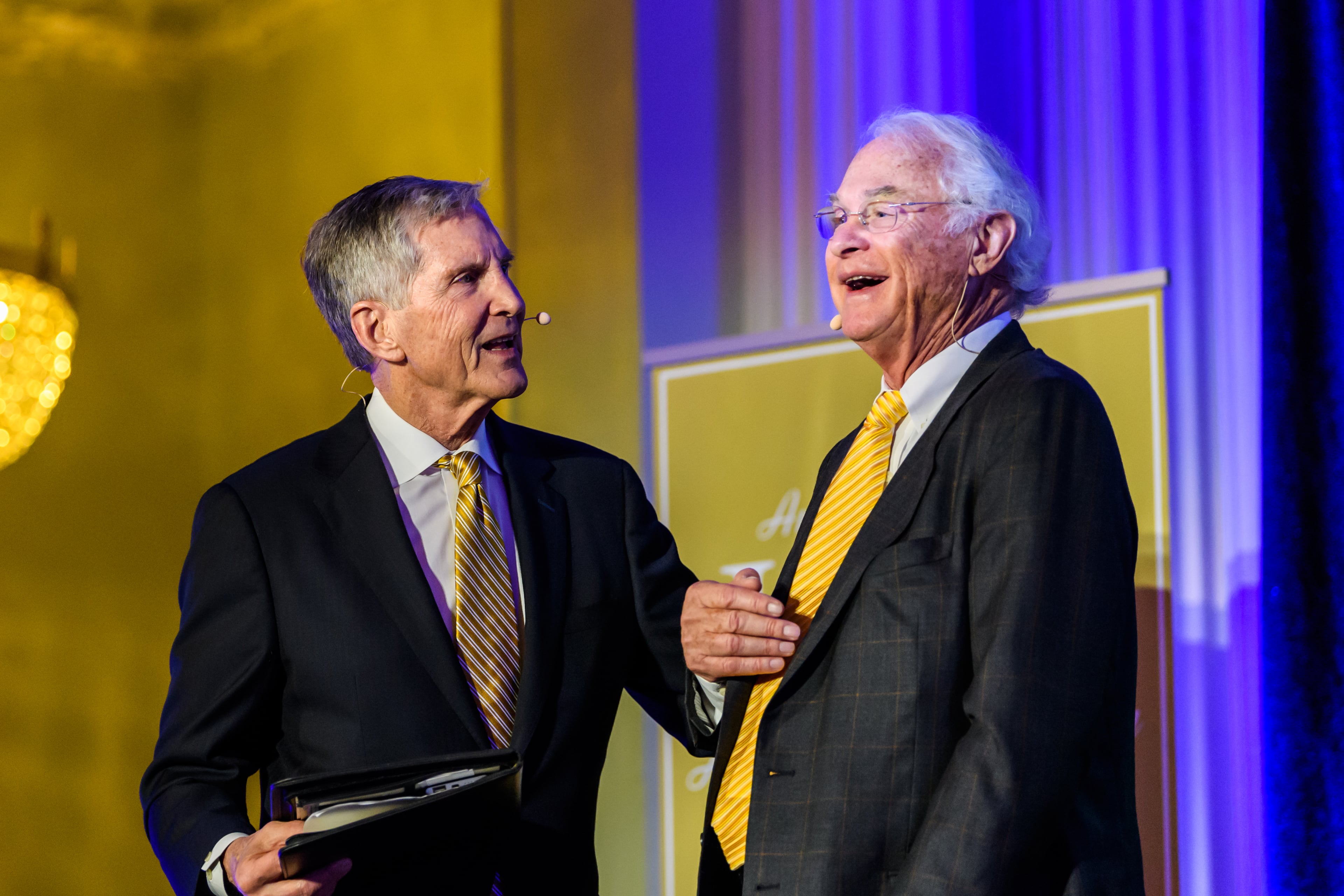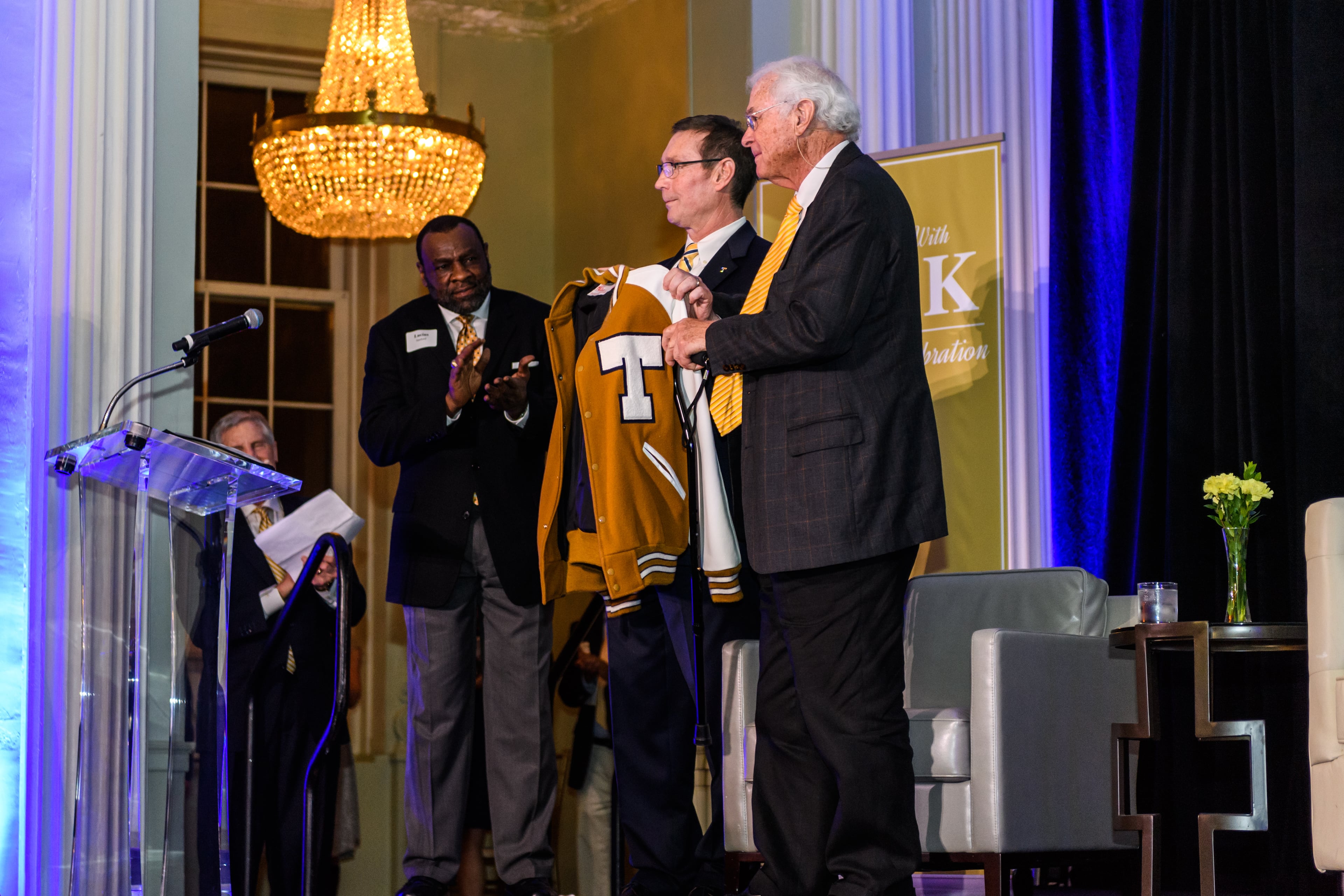Remembering generous spirit of Georgia Tech’s Jack Thompson

Old friends reconnected and hugged. Elsewhere within the Callaway Club of Georgia Tech’s McCamish Pavilion, introductions and connections were made between people who had never met, with phone numbers dutifully being punched in.
As friends and loved ones of longtime Tech athletic fundraiser Jack Thompson drew together Friday to remember him following his death July 21 at the age of 85, first at a memorial service at a Sandy Springs funeral home and later at a reception at McCamish, the gatherings enabled the sort of connections that Thompson so cherished. He probably would have delighted in it.
“I think he’s just a natural connector of people and really enjoyed being that connection,” Tech athletic director Todd Stansbury said Thursday. “He was always trying to figure out who you need to know to help you.”
Thompson was a prolific fundraiser, serving Tech in that role from 1982 to his retirement in 2018, and even after that as a special assistant to Stansbury. That followed his first roles at Tech, starting in 1968 as the football team’s recruiting director, then as an assistant to coach Pepper Rodgers and later an assistant AD beginning in 1977. He led fundraising for the construction or major renovation of every athletics facility on campus.
“When you look at the people who donated to AI 2020 (Tech’s $125 million capital campaign that concluded in March), I would say almost all of them are Jack Thompson connections in one way or another,” Stansbury said. “And, of course, (associate vice president for athletics development) Jim Hall was his protégé. … (Thompson’s) fingerprints are all over AI 2020.”

But, as he was remembered, his gift for finding ways to help others was the quality most celebrated. Thompson was known for invariably asking of others how he could help them.
“I think the thing that defined him most, and what anybody that knows him, first thing they go to is how he helped them in some way,” Stansbury said. “That was kind of like his go-to.”
The example of former quarterback and team captain Tevin Washington illustrates the influence Thompson provided to possibly hundreds of Yellow Jackets athletes and countless others in his circle.
Their relationship began in 2010, as Washington was becoming the starting quarterback. Thompson called him to his office after learning that Washington had written a thank-you note to the donor whose family was endowing his scholarship, Diane Griffin.
Not knowing the reason for the invitation, “I thought I was in trouble,” Washington said.
Instead, Washington said Thompson told him that it was the first time he could remember hearing of a Tech athlete doing so, and in turn offered the quarterback his help. For starters, he lent Washington a book listing corporate leaders in Atlanta. Thompson told him that he would connect him with anyone in the book that he knew, those whose names he had circled.
“You go through that book, and the majority of them have circles,” Washington said.
It began a relationship in which the two met a few times every semester for the remainder of his time at Tech.
“It was him being a mentor mentoring me about things about life more than school or work or football,” Washington said.
They remained in touch after Washington graduated and began his professional career and then returned to Tech as a graduate assistant for then-coach Paul Johnson. When he was hired full-time and still wanted to finish his master’s degree, Thompson helped him secure a scholarship that covered the fees for his last two classes.
Washington is convinced that Thompson’s influence was instrumental in enabling him to remain on the football staff when Johnson stepped down at the end of the 2018 season and was replaced by Geoff Collins. And when Washington decided to leave Collins’ staff in 2019, Thompson again came to his aid, this time helping him land a job as a project engineer with his son Scott’s construction company.
Thompson didn’t ask for much in return, save Washington’s occasional insights on how the team was doing, although there was one time in 2019 when Thompson asked for Washington’s help in securing some new Tech gear. Washington recalled Thompson’s delight when he was able to deliver T-shirts and hoodies.
Thompson’s consideration of Washington extended even past the more obvious needs of work or school. For instance, Thompson once lined him up with a speech coach, believing that if Washington cleaned up his drawl, it could help him professionally.
Washington considered him a mentor, “one of the greatest influences on me personally” and a role model.
“Because Jack has a natural way of giving and also a way of serving others that is unlike or unmatched by anyone else that I’ve dealt with on a professional level,” Washington said.

Thompson gave in a similar way to the Tech students who interned for him as administrative assistants, such as Siera Lyons, a 2014 Tech graduate. Beyond offering his example as a successful professional – “he was always so poised and he carried himself so well in every situation,” Lyons said – Thompson modeled for him the same generosity that he showed Washington and countless Tech athletes.
“One of the biggest things that I will never forget about him is he never made empty promises,” Lyons said. “He used to always end his emails with, ‘Please let me know if there’s anything I can do for you.’ I’m guilty of saying that in my everyday (life and not always following through). He truly did mean it every time he said it.”
Stansbury himself could attest to Thompson’s generosity. When he was a football player in the early ′80s, he knew Thompson as the person to see to help with finding an internship or a job. Thompson, in fact, made calls to help Stansbury land his first job, as a credit manager with a bank.
When Stansbury was hired as athletic director in 2016, he leaned heavily on Thompson to introduce him to alumni, donors and notable members of the Atlanta community. Stansbury was in awe, as Washington had been, of the depth and breadth of Thompson’s circle.
“Everybody knows about his renowned Rolodex, and how Jack knows everybody,” Stansbury said.
(The subject of the Rolodex came up in the funeral service. Charles Smithgall, a donor and longtime friend, shared how he once told former Tech president G.P. “Bud” Peterson that he hoped Thompson died before him, so he could get his hands on his Rolodex. Peterson replied, “Charles, you’d better get in line.”)
A distinguished group of Black men in their 60′s who came to pay their respects Friday testified to another significant way that Thompson served Tech. Coming to Tech in 1968 from South Carolina, where he served many roles including head swim coach, Thompson worked for football coach Bud Carson as his recruiting director. That work included his recruitment of the first Black football players to play on scholarship for Tech, men such as Eddie McAshan, Joe Harris and Lucius Sanford. It perhaps goes without saying that Thompson, a white man born in 1936 and raised in Kentucky, was leading Tech into this new realm at a time when it was not the most well-received initiative.
“The integration procedure at Tech was difficult,” Thompson said in a video interview recorded by the institute in 2017. “There were things that we’re not proud of, let’s just put it that way. But I tried to stay very, very close to them. I still do.”
Beyond recruiting them, he mentored them and helped them through Tech. He stayed in touch, too, with those who didn’t make it to graduation. And, upon their leaving Tech, he connected them with jobs, counseled them on best business practices and helped others who had lost their way due to drugs or alcohol, Harris said.
“He would watch over them until they got back on their feet,” Harris said. “He was serious in helping.”
The throngs of Tech alumni and donors, past and present athletic-department staff and athletes (a short list: Bill Curry, Homer Rice, Bobby Cremins, Roger Kaiser, Eddie Lee Ivery, Robert Lavette, Josh Pastner, Danny Hall and Bruce Heppler,) who attended Friday’s gatherings spoke to the goodwill that Thompson had generated among so many, to say nothing of his indelible impact on the athletic department. A man who worked under Bobby Dodd (when he was athletic director), counted as friends men who had played for William Alexander, raised literally hundreds of millions of dollars, provided counsel and aid to generations of Jackets athletes and coaches is no longer, survived by wife, Mary; son; Scott Thompson; daughter; Tracy Chuck; two grandchildren and the memories held by those whose lives he graced.
“He’s a true friend,” said former Tech quarterback John Dewberry, a close friend of Thompson’s. “As it relates to Georgia Tech, in a less famous way, he’s as important to Georgia Tech as coach Dodd and Homer Rice.”



